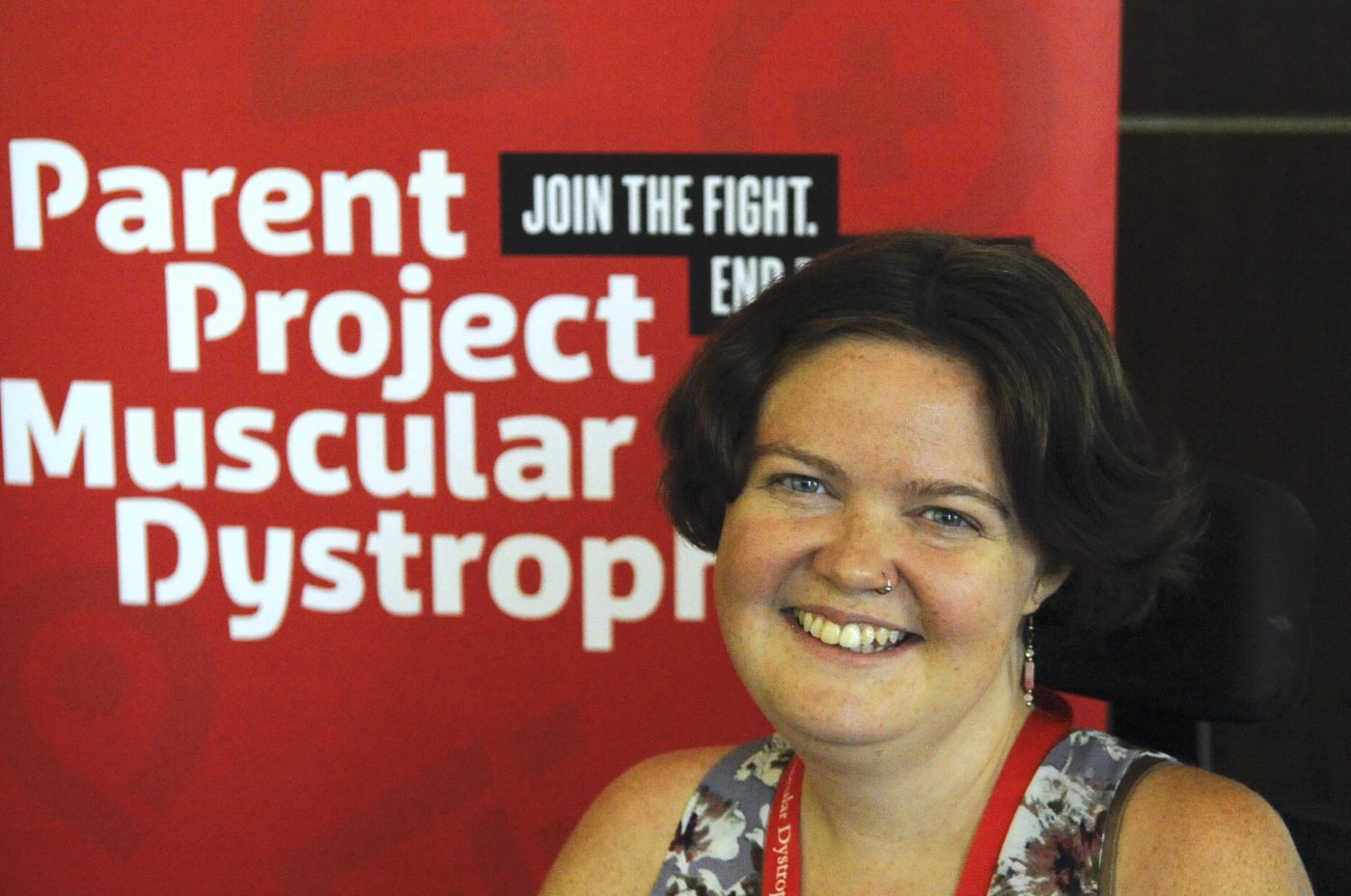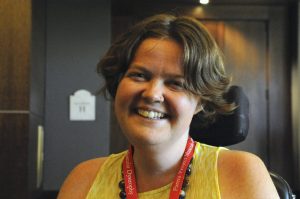Arizona Woman with Duchenne is a Rarity Among the Rare

Elizabeth Heller, 31, of Tempe, Arizona, is one of the nation's few women with Duchenne. (Photos by Larry Luxner)
Duchenne muscular dystrophy affects an estimated 1 in 3,500 male births. But Elizabeth Heller is an outlier even among her rare friends.
The Chicago-born Heller, who relocated to Tempe, Arizona, three years ago, is one of only a handful of women with Duchenne in the United States. According to the 2016 study, “Phenotypic contrasts of Duchenne Muscular Dystrophy in women: Two case reports,” the disease strikes only 1 in 50 million female births.
“I’m definitely in a somewhat unique position,” Heller said on the sidelines of the recent 2018 Annual PPMD Conference in Phoenix, which was organized by Parent Project Muscular Dystrophy. “There are about 10 of us in the whole country, and I don’t fit in any of the boxes at this conference. But I’ve also been so supported by this community.”
Heller, 31, is what’s known in the muscular dystrophy world as a “manifesting carrier.” Essentially, this means that she manifests certain symptoms of the disease, such as mild muscular weakness or severe clinical complications.
This is because the mutated gene responsible for Duchenne is located in the X chromosome. Girls have two X chromosomes, meaning that the body usually inactivates the chromosome that carries the mutation. The female will carry the mutation, but manifest little to no symptoms of the disease.
However, if most cells in the body have the other, healthy, chromosome inactive, the female will not only carry the mutation but also have symptoms of the disease.
In general, those who show signs of DMD before the age of 15 often develop more severe symptoms.
“Generally speaking, your body will default to the correct one — but not always, for reasons we don’t totally understand,” Heller said while sitting on her specialized, $40,000 electric wheelchair. “For me, it’s something less than Duchenne. I still have reasonable heart function, but I haven’t been able to walk in about 10 years. So it profoundly impacts my life.”
Heller received her Duchenne diagnosis in 1997, at the age of 11.
“I started falling, and had trouble running. You know, when they make you run the mile in elementary school, I would struggle with that,” she said. “My pediatrician recognized that some of the ways I moved were classic DMD. So she sent my parents to a neurologist. They did a muscle biopsy and confirmed that it was DMD.”
20 years with Duchenne, and counting
Heller, who proudly wears a nose ring she got on her 18th birthday, said life with Duchenne is a “constant struggle.”
“I have about half of normal lung function, which is enough. I don’t need a ventilator or breathing assistance,” she said. “But I have to be very careful what I eat. I have to hire people to get me out of bed and get me to work. And I can’t use the bathroom or bathe independently.”
To make matters worse, Heller said she gets no financial assistance at all.
“Arizona doesn’t have much in the way of social support, and there is no Medicaid waiver here,” she said. “I’m married and have an income, so I don’t qualify for benefits.”
Private insurance through Heller’s employer pays her prescription for Emflaza (deflazacort) — an FDA-approved corticosteroid sold by PTC Therapeutics that can cost anywhere from $35,000 to more than $100,000 per year, depending on the patient’s weight. Previously, she ordered it from European sources for $1,200 a year.
“I’ve had to lower my dose a few times because the side effects are too brutal,” said Heller, who’s been on Emflaza since the age of 17. “Steroid rage is no joke. It makes you angry all the time. I’ve gained 30 pounds from the steroids. But when I lowered the dosage, I also noticed some loss of strength.”
Heller also takes Coenzyme Q10 — an anti-oxidant — as well as vitamin D, and is trying to get into BreatheDMD, Santhera’s expanded-access trial for Raxone (idebenone).
Despite her disabilities, the young woman earned a master’s degree in geographic science and technology from North Carolina State University in Raleigh, N.C. She currently conducts spatial analysis and mapping for the Arizona Department of Water Resources.
“My boss has been super supportive. I work from home one day a week; it’s helpful for me as a disabled person,” she said, adding that she and her husband — a music history professor at Arizona State University — specifically bought a house located on a bus line, which makes it easier for her to get to and from work.
“I can’t pick up heavy things or reach really far, but I can function just fine in an office environment,” she said. “I’ve been disabled my whole adult life. I see other people doing all these things I want to do but can’t. But you don’t get to pick your battles. It’s really hard on my family and on my husband. He’s had to do so much.”
That said, Heller considers herself lucky. The couple does not plan to have children because she’s reluctant to risk passing the disease on to future generations.
“My two sisters and my mother have the same deletion — exon 46 to 52 — but with no effects,” she said. “My older sister has two sons, one with Duchenne and the other without. I haven’t done in-depth studies, because there was no reason to, but I’m going to start pursuing that now.”








